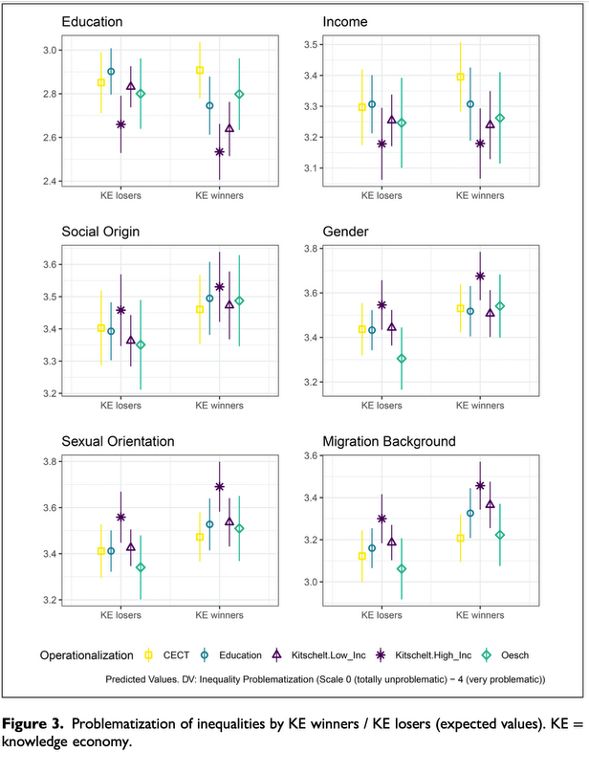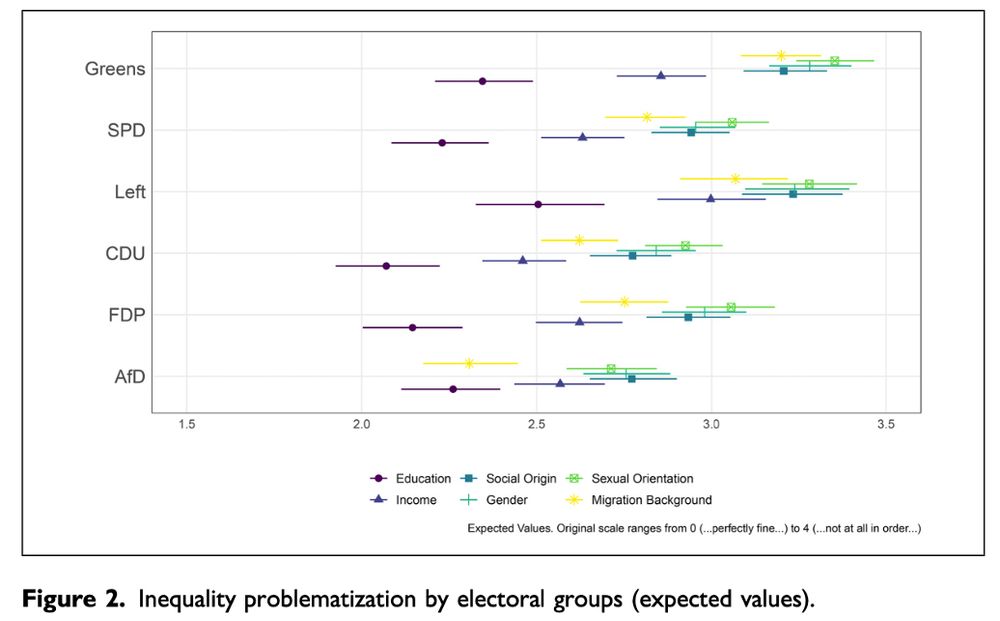Delia Zollinger
@dpzollinger.bsky.social
Postdoc at EUI & Uni Zurich | political behavior, comparative politics, political sociology, political economy
Thank you, Luca 🙏 I also look forward to the next chance to catch up and hear about your current projects!
November 6, 2025 at 5:19 PM
Thank you, Luca 🙏 I also look forward to the next chance to catch up and hear about your current projects!
We stress the importance of social structure for polarization along a new cleavage --> policies shaping network segregation matter!
Also see this paper by @jonadejong.bsky.social @jonnekamphorst.bsky.social who come to similar conclusions based on different data/countries. tinyurl.com/47edtwtc
Also see this paper by @jonadejong.bsky.social @jonnekamphorst.bsky.social who come to similar conclusions based on different data/countries. tinyurl.com/47edtwtc
Sage Journals: Discover world-class research
Subscription and open access journals from Sage, the world's leading independent academic publisher.
tinyurl.com
November 6, 2025 at 8:28 AM
We stress the importance of social structure for polarization along a new cleavage --> policies shaping network segregation matter!
Also see this paper by @jonadejong.bsky.social @jonnekamphorst.bsky.social who come to similar conclusions based on different data/countries. tinyurl.com/47edtwtc
Also see this paper by @jonadejong.bsky.social @jonnekamphorst.bsky.social who come to similar conclusions based on different data/countries. tinyurl.com/47edtwtc
We fielded a survey in UK/DE/CH to study people’s close social ties. We observationally show that educational divides regarding party support, attitudes & identities are moderated by network composition.
Our theoretical argument on networks' stabilizing role links cleavage/social network research.
Our theoretical argument on networks' stabilizing role links cleavage/social network research.
November 6, 2025 at 8:28 AM
We fielded a survey in UK/DE/CH to study people’s close social ties. We observationally show that educational divides regarding party support, attitudes & identities are moderated by network composition.
Our theoretical argument on networks' stabilizing role links cleavage/social network research.
Our theoretical argument on networks' stabilizing role links cleavage/social network research.
Congrats to both of you! 🥳
October 15, 2025 at 9:38 AM
Congrats to both of you! 🥳
But at the party system level, the lower divisiveness of socioeconomic inequalities may reduce incentives for parties to mobilize on these as opposed to sociocultural issues, potentially fostering a crowding out of traditional socioeconomic inequalities by sociocultural conflicts.
7/n
7/n
July 29, 2025 at 12:19 PM
But at the party system level, the lower divisiveness of socioeconomic inequalities may reduce incentives for parties to mobilize on these as opposed to sociocultural issues, potentially fostering a crowding out of traditional socioeconomic inequalities by sociocultural conflicts.
7/n
7/n
For the progressive left, this article confirms previous findings that there does not seem to be an electoral tradeoff between adopting economically redistributive and culturally progressive positions. See e.g. tinyurl.com/mrpdzc9p
6/n
6/n
Project MUSE - Trade-Offs of Social Democratic Party Strategies in a Pluralized Issue Space: A Conjoint Analysis
tinyurl.com
July 29, 2025 at 12:19 PM
For the progressive left, this article confirms previous findings that there does not seem to be an electoral tradeoff between adopting economically redistributive and culturally progressive positions. See e.g. tinyurl.com/mrpdzc9p
6/n
6/n
Studying the structural foundations of these inequality perceptions highlights that even the social groups who belong to the relative “winners” of socioeconomic change–known to support the progressive left–are still averse to inequality across the board.
5/n
5/n

July 29, 2025 at 12:19 PM
Studying the structural foundations of these inequality perceptions highlights that even the social groups who belong to the relative “winners” of socioeconomic change–known to support the progressive left–are still averse to inequality across the board.
5/n
5/n
We find support for the second hypothesis: Progressive left voters are more concerned about all types of inequality than conservative center right and especially far right constituencies.
4/n
4/n

July 29, 2025 at 12:19 PM
We find support for the second hypothesis: Progressive left voters are more concerned about all types of inequality than conservative center right and especially far right constituencies.
4/n
4/n

